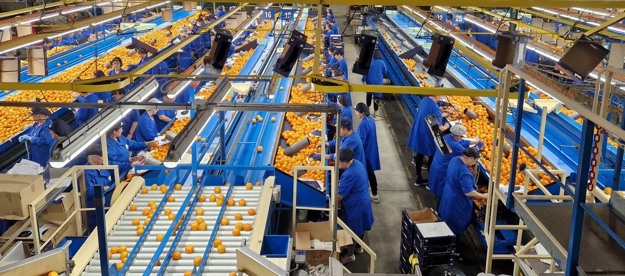The severe storm that hit many parts of the province of Valencia and caused a tragic flood on October 29 was preceded by heavy rainfall in all citrus-producing areas in the country. After the human and material tragedy caused by it, in the days that followed, and for almost a week, the storm persisted and the phenomenon moved both to the north, towards the Valencian province of Castellon, and to the south, where it also hit Andalusian production areas such as Seville, Huelva and Cadiz. "During the last two weeks, in addition to the astronomical losses suffered by the agricultural sector as a whole, the citrus season has slowed down because it hasn't been possible to harvest after the flood, as access to the fields and transport from the warehouses to the destinations has been very difficult," says the President of the Citrus Management Committee (CGC), Inmaculada Sanfeliu. At the moment, and following consultations with the associates of this entity, which accounts for 80% of all citrus exports from Spain and between 60 and 70% of the supply to the domestic market, all packing warehouses in the province of Valencia are already working at full capacity, so "all large European retailers in the EU are guaranteed a good supply of mandarins and oranges," says Sanfeliu.

The CGC agrees with the assessment made a few days ago by the main Valencian agricultural organizations, which stressed that most of the damage caused to the sector has affected agricultural infrastructures, ways permitting access to plots and the facilities and equipment of these farms (reservoirs, main pipes, irrigation wells, walls, fences and enclosures...). However, it is also no less true that, as far as citrus-growing areas are concerned, the bulk of the losses caused by the heavy rainfall and floods have been reported in the Ribera Alta, Ribera Baja and in specific municipalities with a citrus-growing tradition, such as Pedralba (in the north-east of the province, in Los Serranos). For the rest of the province's main citrus growing areas, such as those in La Safor (which accounts for a large part of Spain's private citrus trade), Camp de Morvedre, Camp de Túria and, to a lesser extent, those of L'Horta Nord, Sur and Oest, as well as, much further south, La Costera, the rains have only caused minor problems. In these latter areas of the province of Valencia, as well as in practically the whole of the provinces of Castellon and Alicante and all the citrus-growing regions of Andalusia and Murcia, the rainfall has likely been beneficial, because it will allow many varieties to grow to larger sizes, helping alleviate the effects of two consecutive years of severe drought.
"As soon as we manage to fully access the affected fields, most of which are still muddy, we will certainly be able to harvest a good part of this fruit, because it will be ready to be marketed fresh or to be processed into juice," says the CGC manager. Although this has undoubtedly been the worst and most destructive storm in living memory, the CGC says that the private sector has a lot of experience in managing this type of situations. "Our warehouses have the right technology and know-how to guarantee a quality supply to the EU," says Sanfeliu.
Connections
In the province of Valencia, the main challenge for the export sector, other than having to obtain supplies from the many other unaffected Spanish citrus growing areas (as it actually does every year) is the logistics. Key infrastructures for road traffic have suffered severe damages, and several sections of key motorways remain cut off. However, the restrictions on heavy traffic have already been partially lifted and it has been reported that the emergency repair work on the ring road around the city of Valencia is nearing completion and that in a few days the construction of a provisional detour will be finished, allowing the section that is currently closed to be reopened. However, given the recurring traffic problems, the CGC has already asked the authorities to enable a corridor to allow the priority delivery of perishable products such as citrus fruits. "The experience gained in Spain and Europe with the COVID restrictions and quarantines shows us that such initiatives are a valid emergency solution. Many in the industry and service sectors will be forced to take paid work leave. In the citrus sector, we need solutions to be able to continue providing a service to our clients," says Sanfeliu.
 For more information:
For more information:
CGC
www.citricos.org










